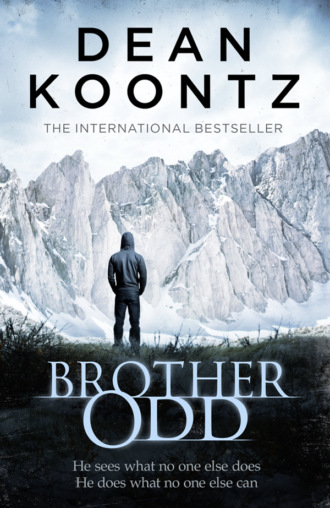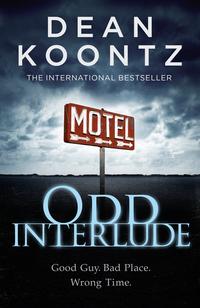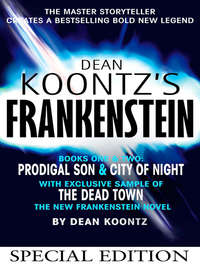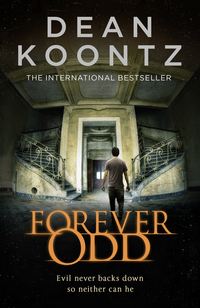
Полная версия
Brother Odd
A single death does not draw them, or two deaths, or even three. They prefer operatic violence, and for them the performance is not over when the fat lady sings, but only when she is torn to pieces.
They seem incapable of affecting our world, as though they are not fully present in this place and this time, but are in some way virtual presences. They are travelers, observers, aficionados of our pain.
Yet I fear them, and not solely because their presence signals oncoming horror. While they seem unable to affect this world in any significant way, I suspect that I am an exception to the rules that limit them, that I am vulnerable to them, as vulnerable as an ant in the shadow of a descending shoe.
Seeming whiter than usual in the company of inky bodachs, Boo did not growl, but watched these spirits with suspicion and disgust.
I pretended to have come here to assure myself that the thermostat had been properly set, to raise the pleated shades and confirm that the window had been firmly closed against all drafts, to dredge some wax from my right ear and to pry a shred of lettuce from between two teeth, though not with the same finger.
The bodachs ignored me—or pretended to ignore me.
Sleeping Justine had their complete attention. Their hands or paws hovered a few inches over the girl, and their fingers or talons described circles in the air above her, as if they were novelty-act musicians playing an instrument composed of drinking glasses, rubbing eerie music from the wet crystal rims.
Perhaps, like an insistent rhythm, her innocence excited them. Perhaps her humble circumstances, her lamblike grace, her complete vulnerability were the movements of a symphony to them.
I can only theorize about bodachs. I know nothing for certain about their nature or about their origins.
This is true not only of bodachs. The file labeled THINGS ABOUT WHICH ODD THOMAS KNOWS NOTHING is no less immense than the universe.
The only thing I know for sure is how much I do not know. Maybe there is wisdom in that recognition. Unfortunately, I have found no comfort in it.
Having been bent over Justine, the three bodachs abruptly stood upright and, as one, turned their wolfish heads toward the door, as if in response to a summoning trumpet that I could not hear.
Evidently Boo could not hear it, either, for his ears did not prick up. His attention remained on the dark spirits.
Like shadows chased by sudden light, the bodachs whirled from the bed, swooped to the door, and vanished into the hallway.
Inclined to follow them, I hesitated when I discovered Justine staring at me. Her blue eyes were limpid pools: so clear, seemingly without mystery, yet bottomless.
Sometimes you can be sure she sees you. Other times, like this, you sense that, to her, you are as transparent as glass, that she can look through everything in this world.
I said to her, “Don’t be afraid,” which was twice presumptuous. First, I didn’t know that she was frightened or that she was even capable of fear. Second, my words implied a guarantee of protection that, in the coming crisis, I might not be able to fulfill.
Too wise and humble to play the hero, Boo had left the room.
As I headed toward the door, Annamarie, in the first bed, murmured, “Odd.”
Her eyes remained closed. Knots of bedsheet were still clutched in her hands. She breathed shallowly, rhythmically.
As I paused at the foot of her bed, the girl spoke again, more clearly than before: “Odd.”
Annamarie had been born with myelocele spina bifida. Her hips were dislocated, her legs deformed. Her head on the pillow seemed almost as large as the shrunken body under the blanket.
She appeared to be asleep, but I whispered, “What is it, sweetie?”
“Odd one,” she said.
Her mental retardation was not severe and did not reveal itself in her voice, which wasn’t thick or slurred, but was high and sweet and charming.
“Odd one.”
A chill prickled through me equal to the sharpest bite of the winter night outside.
Something like intuition drew my attention to Justine in the second bed. Her head had turned to follow me. For the first time, her eyes fixed on mine.
Justine’s mouth moved, but she did not produce even one of the wordless sounds of which, in her deeper retardation, she was capable.
While Justine strove unsuccessfully to speak, Annamarie spoke again: “Odd one.”
The pleated shades hung slack over the windows. The plush-toy kittens on the shelves near Justine’s bed sat immobile, without one wink of eye or twitch of whisker.
On Annamarie’s side of the room, the children’s books on her shelves were neatly ordered. A china rabbit with flexible furry ears, dressed in Edwardian clothes, stood sentinel on her nightstand.
All was still, yet I sensed an energy barely contained. I would not have been surprised if every inanimate object in the room had come to life: levitating, spinning, ricocheting wall to wall.
Stillness reigned, however, and Justine tried to speak again, and Annamarie said, “Loop,” in her sweet piping voice.
Leaving the sleeping girl, I moved to the foot of Justine’s bed.
For fear that my voice would shatter the spell, I did not speak.
Wondering if the brain-damaged girl had made room for a visitor, I wished the bottomless blue eyes would polarize into a particular pair of Egyptian-black eyes with which I was familiar.
Some days I feel as if I have always been twenty-one, but the truth is that I was once young.
In those days, when death was a thing that happened to other people, my girl, Bronwen Llewellyn, who preferred to be called Stormy, would sometimes say, Loop me in, odd one. She meant that she wanted me to share the events of my day with her, or my thoughts, or my fears and worries.
During the sixteen months since Stormy had gone to ashes in this world and to service in another, no one had spoken those words to me.
Justine moved her mouth without producing sound, and in the adjacent bed, Annamarie said in her sleep, “Loop me in.”
Room 32 seemed airless. Following those three words, I stood in a silence as profound as that in a vacuum. I could not breathe.
Only a moment ago, I had wished these blue eyes would polarize into the black of Stormy’s eyes, that the suspicion of a visitation would be confirmed. Now the prospect terrified me.
When we hope, we usually hope for the wrong thing.
We yearn for tomorrow and the progress that it represents. But yesterday was once tomorrow, and where was the progress in it?
Or we yearn for yesterday, for what was or what might have been. But as we are yearning, the present is becoming the past, so the past is nothing but our yearning for second chances.
“Loop me in,” Annamarie repeated.
As long as I remain subject to the river of time, which will be as long as I may live, there is no way back to Stormy, to anything. The only way back is forward, downstream. The way up is the way down, and the way back is the way forward.
“Loop me in, odd one.”
My hope here, in Room 32, should not be to speak with Stormy now, but only at the end of my journey, when time had no more power over me, when an eternal present robbed the past of all appeal.
Before I might see in those blue vacancies the Egyptian black for which I hoped, I looked away, stared at my hands, which clutched the footboard of the bed.
Stormy’s spirit does not linger in this world, as some do. She moved on, as she should have done.
The intense undying love of the living can be a magnet to the dead. Enticing her back would be an unspeakable disservice to her. And although renewed contact might at first relieve my loneliness, ultimately there is only misery in hoping for the wrong thing.
I stared at my hands.
Annamarie fell silent in her sleep.
The plush-toy kittens and the china rabbit remained inanimate, thus avoiding either a demonic or a Disney moment.
In a while, my heart beat at a normal rate once more.
Justine’s eyes were closed. Her lashes glistened, and her cheeks were damp. From the line of her jaw were suspended two tears, which quivered and then fell onto the sheet.
In search of Boo and bodachs, I left the room.
CHAPTER 3
Into the old abbey, which was now St. Bartholomew’s School, had been transplanted modern mechanical systems that could be monitored from a computer station in the basement.
The spartan computer room had a desk, two chairs, and an unused file cabinet. Actually, the bottom drawer of the cabinet was packed with over a thousand empty Kit Kat wrappers.
Brother Timothy, who was responsible for the mechanical systems of both the abbey and the school, had a Kit Kat jones. Evidently, he felt that his candy craving was uncomfortably close to the sin of gluttony, because he seemed to be hiding the evidence.
Only Brother Timothy and visiting service personnel had reason to be in this room frequently. He felt his secret was safe here.
All the monks knew about it. Many of them, with a wink and a grin, had urged me to look in the bottom drawer of the file cabinet.
No one could have known whether Brother Timothy had confessed gluttony to the prior, Father Reinhart. But the existence of his collection of wrappers suggested that he wanted to be caught.
His brothers would be happy to discover the evidence, although not until the trove of wrappers grew even larger, and not until the right moment, the moment that would ensure the greatest embarrassment for Timothy.
Although Brother Timothy was loved by everyone, unfortunately for him, he was also known for his bright blush, which made a lantern of his face.
Brother Roland had suggested that God would have given a man such a glorious physiological response to embarrassment only if He wanted it to be displayed often and to be widely enjoyed.
Posted on a wall of this basement room, referred to by the brothers as the Kit Kat Katacombs, hung a framed needlepoint sampler: THE DEVIL IS IN THE DIGITAL DATA.
Using this computer, I could review the historical performance record as well as the current status of the heating-and-cooling system, the lighting system, the fire-control system, and the emergency-power generators.
On the second floor, the three bodachs still roamed from room to room, previewing victims to enhance the pleasure they would get from carnage when it came. I could learn no more from watching them.
Fear of fire had driven me to the basement. On the screen, I studied display after display relating to the fire-control system.
Every room featured at least one sprinkler head embedded in the ceiling. Every hallway had numerous sprinklers, spaced fifteen feet on center.
According to the monitoring program, all the sprinklers were in order and all the water lines were maintaining the required pressure. The smoke detectors and alarm boxes were functional and periodically self-testing.
I backed out of the fire-control system and called up the schema of the heating-and-cooling systems. I was particularly interested in the boilers, of which the school had two.
Because no natural-gas service extended to the remote Sierra, both boilers were fired by propane. A large pressurized storage tank lay buried at a distance from both the school and the abbey.
According to the monitors, the propane tank contained 84 percent of maximum capacity. The flow rate appeared to be normal. All of the valves were functioning. The ratio of BTUs produced to propane consumed indicated no leaks in the system. Both of the independent emergency-shutdown switches were operative.
Throughout the schema, every point of potential mechanical failure was signified by a small green light. Not a single red indicator marred the screen.
Whatever disaster might be coming, fire would probably not be a part of it.
I looked at the needlepoint sampler framed on the wall above the computer: THE DEVIL IS IN THE DIGITAL DATA.
Once, when I was fifteen, some seriously bad guys in porkpie hats handcuffed me, chained my ankles together, locked me in the trunk of an old Buick, picked up the Buick with a crane, dropped the car into a hydraulic compressing machine of the kind that turns any once-proud vehicle into a three-foot cube of bad modern art, and punched the CRUSH ODD THOMAS button.
Relax. It’s not my intention to bore you with an old war story. I raise the issue of the Buick only to illustrate the fact that my supernatural gifts do not include reliable foresight.
Those bad guys had the polished-ice eyes of gleeful sociopaths, facial scars that suggested they were at the very least adventurous, and a way of walking that indicated either painful testicular tumors or multiple concealed weapons. Yet I did not recognize that they were a threat until they knocked me flat to the ground with a ten-pound bratwurst and began to kick the crap out of me.
I had been distracted by two other guys who were wearing black boots, black pants, black shirts, black capes, and peculiar black hats. Later, I learned they were two schoolteachers who had each independently decided to attend a costume party dressed as Zorro.
In retrospect, by the time I was locked in the trunk of the Buick with the two dead rhesus monkeys and the bratwurst, I realized that I should have recognized the real troublemakers the minute I had seen the porkpie hats. How could anyone in his right mind attribute good intentions to three guys in identical porkpie hats?
In my defense, consider that I was just fifteen at the time, not a fraction as experienced as I am these days, and that I have never claimed to be clairvoyant.
Maybe my fear of fire was, in this case, like my suspicion of the Zorro impersonators: misguided.
Although a survey of selected mechanical systems had given me no reason to believe that impending flames had drawn the bodachs to St. Bart’s School, I remained concerned that fire was a danger. No other threat seemed to pose such a challenge to a large community of the mentally and physically disabled.
Earthquakes were not as common or as powerful in the mountains of California as in the valleys and the flatlands. Besides, the new abbey had been built to the standards of a fortress, and the old one had been reconstructed with such diligence that it should be able to ride out violent and extended temblors.
This high in the Sierra, bedrock lay close underfoot; in some places, great granite bones breached the surface. Our two buildings were anchored in bedrock.
Here we have no tornadoes, no hurricanes, no active volcanoes, no killer bees.
We do have something more dangerous than all those things. We have people.
The monks in the abbey and the nuns in the convent seemed to be unlikely villains. Evil can disguise itself in piety and charity, but I had difficulty picturing any of the brothers or sisters running amok with a chain saw or a machine gun.
Even Brother Timothy, on a dangerous sugar high and crazed by Kit Kat guilt, didn’t scare me.
The glowering Russian staying on the second floor of the guesthouse was a more deserving object of suspicion. He did not wear a porkpie hat, but he had a dour demeanor and secretive ways.
My months of peace and contemplation were at an end.
The demands of my gift, the silent but insistent pleas of the lingering dead, the terrible losses that I had not always been able to prevent: These things had driven me to the seclusion of St. Bartholomew’s Abbey. I needed to simplify my life.
I had not come to this high redoubt forever. I had only asked God for a time-out, which had been granted, but now the clock was ticking again.
When I backed out of the heating-and-cooling-system schema, the computer monitor went to black with a simple white menu. In that more reflective screen, I saw movement behind me.
For seven months, the abbey had been a still point in the river, where I turned in a lazy gyre, always in sight of the same familiar shore, but now the true rhythm of the river asserted itself. Sullen, untamed, and intractable, it washed away my sense of peace and washed me toward my destiny once more.
Expecting a hard blow or the thrust of something sharp, I spun the office chair around, toward the source of the reflection in the computer screen.
Конец ознакомительного фрагмента.
Текст предоставлен ООО «ЛитРес».
Прочитайте эту книгу целиком, купив полную легальную версию на ЛитРес.
Безопасно оплатить книгу можно банковской картой Visa, MasterCard, Maestro, со счета мобильного телефона, с платежного терминала, в салоне МТС или Связной, через PayPal, WebMoney, Яндекс.Деньги, QIWI Кошелек, бонусными картами или другим удобным Вам способом.







